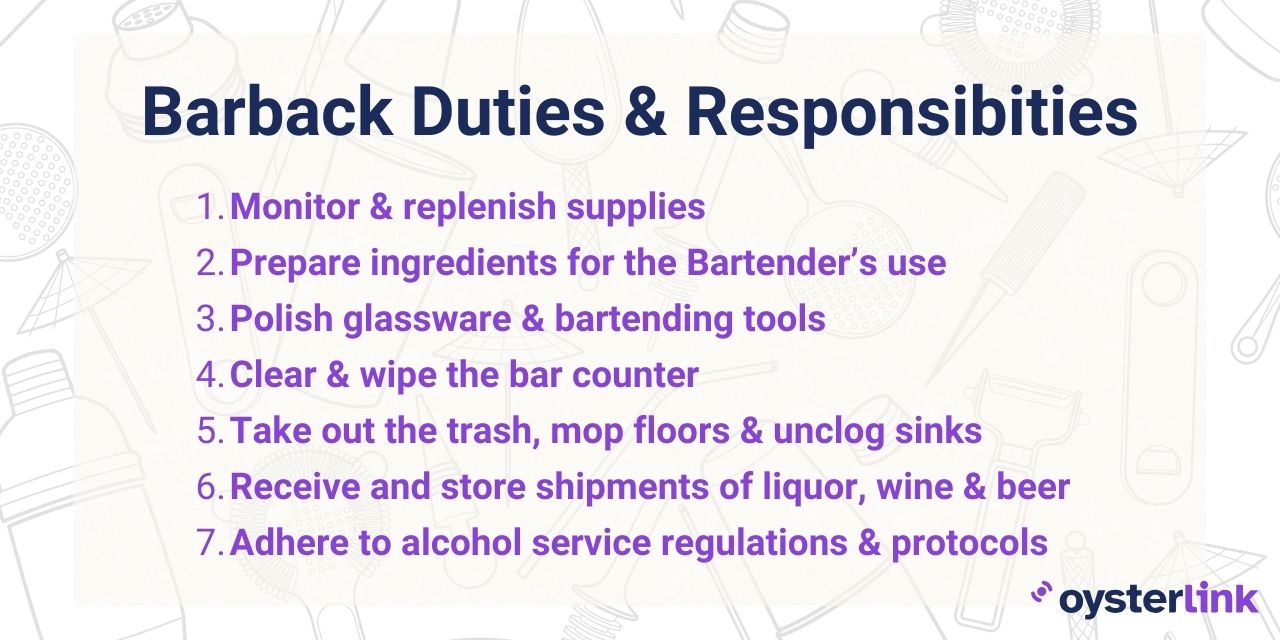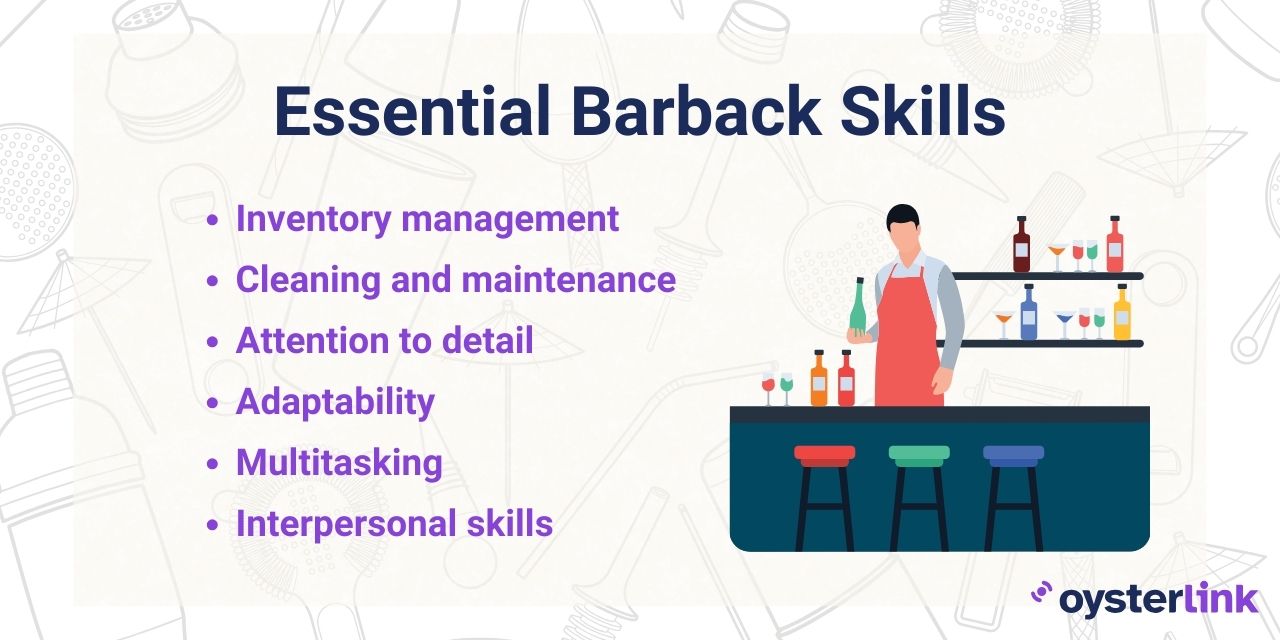This overview provides valuable information about working as a Barback, such as primary responsibilities, salary, career progression and frequently asked questions.
What Is a Barback?
A Barback is a part of the front-of-house staff responsible for maintaining cleanliness and organization in the bar area.
They assist in and handle various tasks to ensure smooth operations, allowing the Bartender to focus on crafting drinks and serving guests.
In some establishments, a Barback might also be referred to as a Bartender’s Assistant, Bar Prep, Bar Runner or Bar Assistant.
What Does a Barback Do?
The daily responsibilities of a Barback include:
- Monitoring and replenishing supplies such as glassware, napkins, coasters, liquor bottles, beer kegs and ingredients
- Preparing ingredients for the Bartender’s use, including cutting garnishes and refilling ice bins
- Washing and polishing glassware, stirrers, shakers and other bartending tools
- Clearing and wiping tables or counters, especially after a customer leaves
- Pouring and refilling beers and wines if needed, often during high-volume shifts
- Assist in taking customers’ orders and collecting payments during peak hours
- Taking out the trash, mopping floors and unclogging sinks
- Receiving and storing shipments of liquor, wine and beer
- Adhering to legal regulations and safety protocols regarding alcohol service

Barback Salary in the US
According to the latest data averaged from Talent.com, ZipRecruiter and Glassdoor, the average salary for Barbacks in the United States is $31,688 base plus tips per year.
California tops the list as the highest-paying state for Barbacks, offering an average salary of $33,198 base plus tips per year. It is followed by Massachusetts, where the average salary is $32,996 base plus tips per year.
Explore the varying compensation levels for this role in each state plus Washington, D.C.
[Calculated using ZipRecruiter, Salary.com, Talent.com, Glassdoor and Zippia data]
This map is interactive. Hover your mouse over different parts of the map to see detailed data.
Keep in mind that most Barbacks earn hourly wages instead of an annual salary. That said, their average wage in the U.S. is $15.23 base plus tips per hour.
There are several factors that affect a Barback’s wage. These include their level of experience or on-the-job training, as well as their workplace’s location and type of establishment.
While a Barback is an entry-level role, those who have previously worked in a bar or similar establishment are more likely to receive higher pay. Additionally, Barbacks working in luxury establishments and/or major cities may also earn more due to higher living costs and the need for such staff members.
Here’s a look at the 2024 Barback wage across four major U.S. cities:
Average Hourly Wage $13.70 + tips
Average Hourly Wage $15.37 + tips
Average Hourly Wage $13.11 + tips
Average Hourly Wage $14.40 + tips
[Calculated using ZipRecruiter, Salary.com, Glassdoor and Talent.com data]
Visit our Barback Salary page for more in-depth information.
What Is the Workplace of a Barback Like?
A Barback’s workplace depends on the type of alcohol-serving establishment in which they serve.
In nightclubs and music venues, they must keep up with a high-energy environment that involves flashing lights and loud music.
On the other hand, bars and pubs tend to offer a more varied pacing. Some hours are fast-paced due to an influx of patrons, while other shifts are more laid-back. The same also applies to restaurants with a bar, except these generally have a broader clientele — from couples and social groups to families with kids.
In contrast, Barbacks who work in wineries or breweries experience a relatively low-volume workplace, given that table reservations are limited. Also, this type of establishment often operates only till late afternoon, which means earlier closing shifts.
Bars at hotels, private clubs and airport lounges offer an upscale setting. Barbacks with this type of workplace get to observe how Bartenders prepare signature drinks for a more discerning clientele.
But no matter the type of establishment, Barbacks are expected to work on weekends, holidays and/or late nights. Additionally, they often have flexible schedules to accommodate varying shifts and event schedules.
How To Start a Barback Career
From learning the basic requirements to knowing the essential skills to succeed in a Barback role, here are the key points to guide you in kickstarting your career in the nightlife and hospitality industry.
Education and Experience Requirements for Barbacks
There are usually no specific education requirements to become a Barback. However, some employers prefer candidates with at least a high school diploma or equivalent (such as a GED), as it shows the candidate has basic literacy, mathematical and communication skills that are necessary for the job.
That said, while having a high school diploma is not always a requirement, it would increase a candidate’s chances of getting hired.
As for experience requirements, these also tend to be lenient given that a Barback is an entry-level role. In most establishments, newly hired Barbacks receive on-the-job training, either through the Bartender or a supervisor/manager. But in some cases, employers prioritize candidates with some previous relevant experience.
Age Requirements for Barbacks
Unlike the education and experience requirements, the age requirements for Barbacks are strictly followed. These vary depending on the state and/or the establishment.
In most states, 18 is the minimum age to serve alcohol. Given that serving drinks can also be part of a Barback’s duties and responsibilities, establishments often use the state-specific requirement as their basis when hiring Barbacks.
However, there are also instances when an establishment has a higher age requirement for Barbacks.
Physical Requirements for Barbacks
Barbacking is a physically demanding job, especially during busy shifts or in establishments that get a lot of customers. It involves a lot of balancing and coordination, endurance, flexibility and standing for extended periods.
The role also entails regularly carrying heavy objects, such as beer kegs and liquor crates. Establishments usually require that Barbacks are able to lift between 30 to 50 pounds.
Other than that, there are generally no strict physical requirements for Barbacks, as long as they can handle the physical demands of the job safely and effectively.
How To Become a Barback With No Experience
Even though Barback roles are entry-level and therefore open to anyone with enough skills and qualifications, here are the steps you can take to get a headstart.
- Learn about the role: Familiarize yourself on what a Barback does so you have a good idea of what to expect. These include both common responsibilities and miscellaneous ones (such as the occasional customer service tasks). You should also find out the common pros and cons of the role.
- Research the industry: When pursuing a Barback career, it’s also important to study the bar and hospitality industry — such as career progression, ingredients in popular beverages and local and state alcohol regulations.
- Build a network: Gain further insight by talking to those with firsthand industry experience, from Barbacks to Bartenders and even business owners. Alternatively, you can join online groups and forums or reach out on social media if you don’t personally know anyone in the industry.
- Apply and prepare for interviews: At the end of the day, the best way to start is through actual Barback training and experience. Keep an eye out for Barback jobs in your area and prepare with OysterLink’s Barback Interview Questions and Answers Guide.

Top Skills of the Best Barbacks
Below are the hard and soft skills you should have and improve on to ensure a successful Barback career.
- Inventory management: Monitoring, organizing and managing inventory levels for various bar supplies
- Cleaning and maintenance: Knowing the basics of hygiene and maintenance standards, such as sanitizing surfaces and polishing glassware
- Attention to detail: Following instructions precisely, arranging items systematically and noticing and addressing issues or discrepancies that may affect operations
- Adaptability: Ability to adjust to last-minute changes, switch between various tasks, work in different environments and handle unexpected and/or high-pressure situations
- Multitasking: Knowing how to execute multiple, simultaneous tasks efficiently and calmly — especially during peak hours
- Interpersonal skills: Ability to effectively communicate and collaborate with Bartenders and other staff members

Barbacks have the opportunity to advance within the hospitality industry through a combination of experience, skill development, networking efforts and strategic career decisions.
Barback Career FAQ
Generally speaking, yes — Barback is a hard and challenging job given the physically demanding tasks, late or irregular hours and fast-paced environment. Nonetheless, barbacking can be a rewarding job and a great way to break into the hospitality industry.
Yes, it’s good to start as a Barback if you’re aiming to build your career in the hospitality industry, whether as an expert Bartender, Bar Manager or even Director of Food & Beverage Operations. Your Barback training will equip you with the necessary skills and experience that would serve as a solid foundation for future roles.
During peak hours, Barbacks might need to perform tasks beyond their usual ones to properly assist Bartenders and other staff members. A Barback’s miscellaneous tasks may include:
- Taking customers’ orders
- Interacting with customers and answering their questions
- Serving non-cocktail drinks (i.e., pouring wine or beer)
- Preparing cocktails with simpler recipes, such as gin and tonic, vodka soda or classic mimosa
- Handling cash and card transactions
- Monitor patrons’ level of intoxication to ensure safety and security
- Helping with setting up during special events like private parties
Not usually; Barbacks generally have limited customer interactions as it is not part of their primary responsibilities. However, there will likely be times when a Barback has to talk to customers, especially when the Bartender needs to prioritize other tasks.
Barbacks may also interact with customers if they are directly asked a question or if they need to assist with basic requests.
Moving from being a Barback to a Bartender can take anywhere from six months to two years. The length of time usually depends on how fast you learn and master the Barback basics.
It could also depend on the experience requirements of a particular Bartender job — whether it’s in your current workplace or a different one.
In general, Barbacks do not typically pour drinks. Their primary role is to support Bartenders by restocking supplies, cleaning the bar area and assisting with other tasks.
However, in some situations — particularly during busy periods — a Barback might be asked to help pour or serve drinks under the guidance of the Bartender.
Although 21 is the legal drinking age in the United States, in some states, you can be a Barback (or possibly a Bartender) even if you’re under 21.
The minimum age requirement will depend on the on-premise alcohol serving laws of the state where you work or will be working.
While some Barbacks may be tasked with maintaining cleanliness in the bar area, including restocking supplies and cleaning surfaces, cleaning bathrooms is not usually part of their job description.
However, in some cases — especially in smaller bars or establishments with limited staff — Barbacks might be asked to assist with various cleaning tasks, which could include cleaning bathrooms.
While a Barback’s duties and responsibilities vary depending on the establishment and/or the Bartender’s needs, here are some common tasks that most Barbacks are either not allowed or not expected to do:
- Mix or prepare alcoholic beverages independently, especially those with more complex recipes
- Create or invent new drink recipes, whether alcoholic or non-alcoholic
- Decide on matters that concern alcohol service and customer behavior management
- Operate bar equipment without supervision
- Handle supervisory tasks such as staff hiring, scheduling and training
- Make managerial decisions or oversee the operation of the bar
- Engage extensively with customers beyond basic interactions or customer service requirements
In most establishments, Barbacks are provided with either a uniform or a dress code. Most Barback uniforms often comprise an all-black attire, an apron and non-slip shoes.
On the other hand, if there is no uniform or strict dress code, most Barbacks opt for dark-color shirts and pants; white clothing is not exactly a practical choice. Additionally, dark-color clothes are more likely to help Barbacks maintain a professional appearance.



